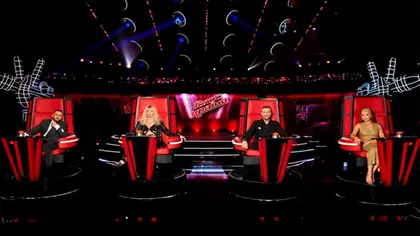It will take more than a Russian invasion to stop the Ukrainian version of hit singing contest “The Voice”, the 12th season of which is currently filming in the war-torn country.
Light entertainment is vital during a war, a Ukrainian delegation told the Mipcom TV conference in Cannes.
JOIN US ON TELEGRAM
Follow our coverage of the war on the @Kyivpost_official.
“Content is our weapon,” Polina Tolmacheva, marketing director for the FILM.UA media group, told AFP.
The challenge for its “young and energetic” TV industry, however, is not just the conflict but replacing the industry’s previously dominant partnership with Russia.
Ukraine already curbed the share of Russian content after hostilities began in 2014 — now there is a total ban.
“Russian content is now unthinkable in Ukraine and we are not going to cry about it,” said Tolmacheva. “We want to tell our own stories, with our values, like freedom.”
Paused after the invasion in February, TV shoots resumed two months later in Kyiv and the west of the country.
But it will be impossible to match its 2021 output when 116 series were produced, and TV advertising revenue reached $400 million.
Today, ad money has dwindled, public funds have been redirected to the army and many professionals have left and are at risk of never returning.
A new campaign, “Ukrainian Content, Global Cooperation”, seeks to draw foreign investment.
‘Not asking for donations’
“We are not asking for donations, we just want to make it clear that Ukraine is a competitive market, rich in ideas and professionals, that we have things to contribute,” said Victoria Yarmoshchuk, CEO of FILM.UA.
Among the new partnerships, Germany’s Red Arrow Studios is co-producing “Those Who Stayed” with FILM.UA, inspired by true stories about Ukrainians who stayed in Kyiv after war broke out.
A German subsidiary of the Gaumont film company is co-producing “In Her Car” about a psychologist offering impromptu therapy sessions while transporting families separated from their loved ones by the fighting.
“None of us were prepared for a crisis of such intensity, but we have taken up the challenge and are doing quite well,” Dmytro Troitskiy, of Ukrainian media group Starlight Media, told a panel in Cannes.
It helps that President Volodymyr Zelensky came from the industry, having replicated the plot of his hit comedy “Servant of the People” in which an actor becomes president.
And however bad things are for TV in Ukraine, the picture for Russia’s small-screen industry is bleak.
Its delegates were banned from Mipcom, most countries are refusing its content, and some shows are also banned at home under new censorship laws.
“The most courageous projects are stuck between a rock and a hard place,” said Larissa Maliukova of opposition newspaper Novaya Gazeta.
You can also highlight the text and press Ctrl + Enter



